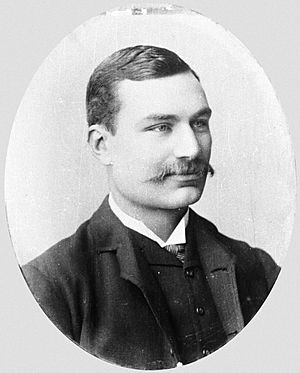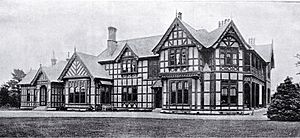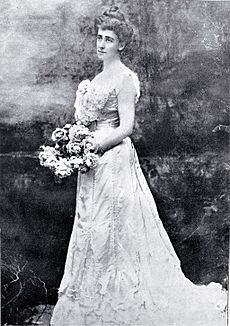Arthur Rhodes (politician) facts for kids
Quick facts for kids
Arthur Rhodes
|
|
|---|---|

Rhodes in ca 1887
|
|
| Member of the New Zealand Parliament for Gladstone |
|
| In office 1887–1890 |
|
| Preceded by | James Sutter |
| Succeeded by | electorate abolished |
| Member of the New Zealand Parliament for Geraldine |
|
| In office 1890–1893 |
|
| Preceded by | Electorate in abeyance |
| Succeeded by | Electorate in abeyance |
| 24th Mayor of Christchurch | |
| In office 1901–1902 |
|
| Preceded by | William Reece |
| Succeeded by | Henry Wigram |
| Personal details | |
| Born | 20 March 1859 The Levels near Timaru, New Zealand |
| Died | 26 December 1922 (aged 63) |
| Resting place | Bromley Cemetery, Christchurch |
| Spouse |
Rose Moorhouse
(m. 1892) |
| Relations | George Rhodes (father) William Barnard Rhodes (uncle) Robert Heaton Rhodes (uncle) Heaton Rhodes (cousin) |
| Residence | Te Koraha |
Arthur Edgar Gravenor Rhodes (20 March 1859 – 26 December 1922) was an important person in New Zealand's history. He was a Member of Parliament (MP), which means he helped make laws for the country. He also served as the Mayor of Christchurch, a major city in New Zealand.
Contents
Early Life and Education
Arthur Rhodes was born on 20 March 1859, on his father's farm called The Levels, near Timaru. His father was George Rhodes.
Arthur went to Christ's College, Christchurch for his schooling. While there, he was a great athlete and was captain of both the cricket and football teams. After that, he went to Jesus College, Cambridge in England. He earned two degrees from there in 1880: a Bachelor of Arts (BA) and a Bachelor of Laws (L.L.B.). In 1882, he became a lawyer at the Inner Temple in London, and then he returned to New Zealand.
Professional Career
When Arthur Rhodes came back to New Zealand, he started his own law firm in Christchurch in 1884. Over time, other lawyers joined his firm, and its name changed a few times. Today, the firm is still active and is known as 'Rhodes & Co'.
Besides his law practice, Arthur Rhodes was involved in many businesses. He was the chairman of the New Zealand Shipping Company, which was a big shipping business. He also chaired The Press, a well-known newspaper.
Arthur Rhodes also loved sports and education. He was the president of the New Zealand Rugby Union and the Canterbury Rugby Union. He also led the board of governors for Canterbury College, which is now the University of Canterbury.
Te Koraha: His Home
After finishing his studies in England, Arthur Rhodes bought a large piece of land in Merivale. He wanted to build a home for his future family. He named his property Te Koraha, which is a Māori word meaning 'the wilderness'.
Building work started in 1884. He had some old cottages removed and built stables and a coach house. The main house, designed by famous architects, began construction in 1886. It was made bigger in 1894 and became a very important place for social gatherings in Christchurch.
Many important people visited or stayed at Te Koraha. These included New Zealand's Governors like George Grey and Lord Islington. When Arthur Rhodes was Mayor, the Duke and Duchess of Cornwall and York (who later became King George V and Queen Mary of the United Kingdom) stayed at Te Koraha during their visit to Christchurch. In 1901, the famous explorer Robert Falcon Scott also stayed there before his journey to Antarctica.
After Arthur Rhodes passed away, his son Tahu inherited the house. It was later leased by Rangi Ruru Girls' School and used as a boarding house. In 2002, it became the school's administration building. The house was badly damaged in the February 2011 Christchurch earthquake but was carefully repaired and reopened in July 2012.
Political Career
Arthur Rhodes had an active career in politics, both at the national and local levels.
Member of Parliament
| New Zealand Parliament | ||||
| Years | Term | Electorate | Party | |
| 1887–1890 | 10th | Gladstone | Independent | |
| 1890–1893 | 11th | Geraldine | Independent | |
Arthur Rhodes was a Member of Parliament for two different areas: Gladstone from 1887 to 1890, and Geraldine from 1890 to 1893. He ran for election again in 1893, 1896, and 1899 but was not successful.
Some newspapers mistakenly reported that Arthur Rhodes was the first New Zealand-born person to become a Member of Parliament. However, this was not correct. John Sheehan, who was also born in New Zealand, became an MP earlier in 1872. Even before that, the first New Zealand-born people to enter Parliament were Māori MPs, who were elected in 1868.
Local Politics: Mayor of Christchurch
Arthur Rhodes also served in local government. He became the Mayor of Christchurch in 1901. Usually, mayoral elections were held in December, but in 1900, they were moved to April 1901 because of special celebrations for Canterbury's Jubilee.
The previous mayor, William Reece, decided not to run again. Arthur Rhodes was the only person nominated for the role, so he was elected without anyone running against him. He served as Mayor for one year and was followed by Henry Wigram in 1902.
Arthur's wife, Rose Rhodes, was also involved in community work. She was the president of the Victoria League Canterbury from 1910 to 1917. The very first meeting of this group in Canterbury was held at their home, Te Koraha.
Family and Later Life
On 10 February 1892, Arthur Rhodes married Rose Moorhouse. Rose was the youngest daughter of James William Moorhouse, and her uncle was William Sefton Moorhouse, a well-known leader in the Canterbury Province. Arthur and Rose had two children.
Their son, Arthur Tahu Gravenor Rhodes, was born on 2 August 1893. He fought in World War I in places like Gallipoli and Egypt, but he had to leave the army due to poor health. In 1916, he married Helen Cecil Olive Plunket, whose father, Lord Plunket, had been the Governor of New Zealand. Tahu Rhodes passed away in 1947.
Their daughter, Rose Mairehau Rhodes, was born on 23 July 1894 at their home, Te Koraha. She later married George Frederick Hutton. Maire Rhodes lived a long life and passed away in 1991. A suburb in Christchurch, Mairehau, is named after her because her father owned land in that area.
Arthur Rhodes died on 26 December 1922. He was buried the next day at Bromley Cemetery in Christchurch. His wife, Rose Rhodes, died ten years later in London.
 | Sharif Bey |
 | Hale Woodruff |
 | Richmond Barthé |
 | Purvis Young |



